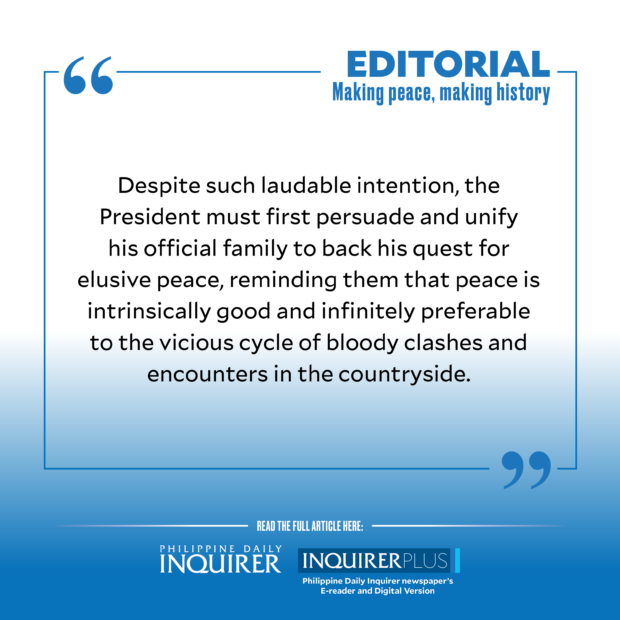
Last week’s announcement that the government and The Hague-based National Democratic Front of the Philippines (NDFP) have agreed to hold peace talks to end the 54-year-long communist insurgency was a pleasant, if unexpected, development even among members of the Marcos administration.
On Nov. 24, President Marcos issued four proclamations granting amnesty to former communist and Moro rebels for acts committed in pursuit of their political beliefs, including rebellion and insurrection.
This turned out to be a prelude to something bigger. The previous day, representatives of the government and the NDFP quietly signed a joint statement in Oslo, Norway, to come up with a framework for negotiations to achieve a “principled and peaceful resolution of the armed conflict.”
Signing the Nov. 23 statement for the government were Presidential Adviser on Peace, Reconciliation and Unity Carlito Galvez Jr. and Special Assistant to the President Antonio Ernesto Lagdameo. The signatories for the NDFP were its chair Luis Jalandoni, negotiating panel chair Julieta de Lima, and member Coni Ledesma. The other signatories were retired Gen. Emmanuel Bautista and Royal Norwegian Government special representative to the Philippines Kristina Lia Revheim.
Agreement with the devilThe agreement was only made public on Nov. 28, through an online press conference by the NDFP panel and a separate briefing in Malacañang by the government panel.
The secrecy was understandable, and perhaps necessary, to preempt any opposition from so-called hawks in the government who frown at peace talks with communist and Moro rebels.
Not long after the twin developments were announced, Vice President Sara Duterte publicly aired her strong opposition to the planned peace talks, which would be the first since her father, former president Rodrigo Duterte, formally scuttled talks with the NDFP in 2017. The Vice President called the planned talks an “agreement with the devil” and said the grant of amnesty was “not the path to peace.”
Show of good faithArmed Forces of the Philippines Chief of Staff Gen. Romeo Brawner Jr. chimed in, saying that the Vice President’s position was “shared by so many in our country, even soldiers.” Brawner said peace negotiations were used by the New People’s Army to strengthen its ranks.
Defense Secretary Gilbert Teodoro, upon his appointment to the Cabinet in June, expressed his position against holding any talks with the communist rebels, saying this was also the view of the security sector.
The contrary voices in government, aired so publicly just as Mr. Marcos was basking in the possibility of peace, do not help promote confidence-building and a conducive environment for a peaceful settlement of what has been described as Asia’s longest-running armed conflict.
Add to this the many conditions, preconditions, and unsolicited advice floating around that could throw a monkey wrench in the planned peace talks.
This early, the NDFP in Negros has asked for the release of almost 800 political prisoners and peace consultants as a “show of good faith.” The Communist Party of the Philippines (CPP) meanwhile asked the government to revoke its designation of the CPP and the NDFP as terrorist organizations, dismantle the National Task Force to End Local Communist Armed Conflict, and repeal the anti-terrorism law.
Terrorist organizations
Such demands have prompted Galvez to issue an appeal urging “other parties to respect the Joint Statement and Oslo Joint Communique and not make preconditions or release propaganda that will water down the peace-building efforts of the previous and current administrations.”
Indeed, the situation could go either way, with all the complications coming up. The government would have to sort out its delicate negotiating position with the CPP/NPA/NDFP, which the Anti-Terrorism Council declared as terrorist organizations in 2017. The designation is a thorn on both sides, as the military would be hard put to give way to peace talks with groups that official policy has designated as terrorists.
In the same vein, the CPP/NPA/NDFP should show an equivalent measure of sincerity by holding off on attacks, which have doomed peace talks in previous administrations. A bilateral and binding ceasefire would help ensure the success of future talks.
Unified nation
Mr. Marcos may have indeed surprised his allies, including his Vice President, by moving to end the insurgency that started during his father’s term. He noted that with the Oslo agreement, “both parties have agreed to a principled and peaceful resolution of the armed conflict so that we may finally face these challenges as a unified nation.”
Despite such laudable intention, the President must first persuade and unify his official family to back his quest for elusive peace, reminding them that peace is intrinsically good and infinitely preferable to the vicious cycle of bloody clashes and encounters in the countryside. With both sides instead engaged in productive pursuits, he can then go on to seal his vindication and make history.

